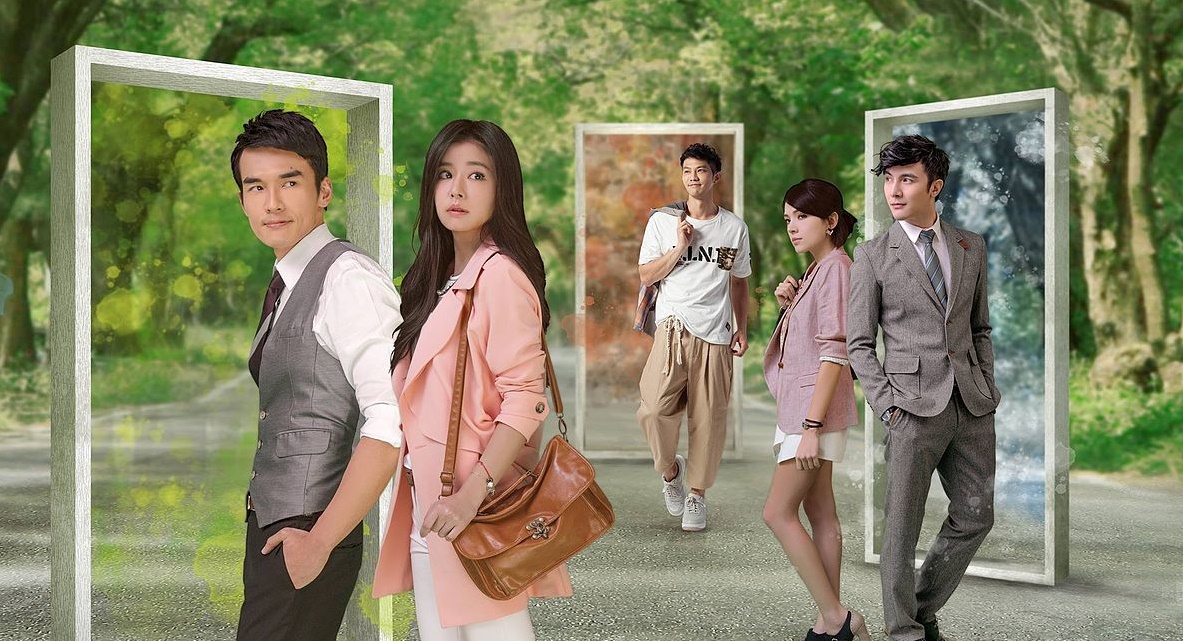
I started The Way We Were in the hopes of finding something that was a cross between In a Good Way and In Time With You. I wanted a thoughtful, realistic drama that was also feel-good and happy. I got half of that equation. While contemplative, nostalgic, and beautifully acted, The Way We Were was a bit too much of a tearjerker for my current tastes.
The Way We Were stars Ruby Lin as Tang Jia Ni, an independent, no-nonsense college student and Leroy Yang as Fang Wei De, her charming, playboy of a neighbor. Also starring are Tiffany Hsu, Melvin Sia, and Jason Tsou as friends Rui Rui, Jun Jie, and Ah Ding. The drama follows the ups and downs of the relationship between these five friends from their college days in 1998 to their reunions in 2008 and 2013.
(Spoilers after the jump.)
In 1998, the five friends are in college. Jia Ni has a bickering friendship with Wei De, and it’s pretty obvious to everyone involved that the two like each other. But Jia Ni’s best friend Jun Jie is also in love with her, and he seems like the better guy, solid and dependable and nice, versus Wei De’s playboy personality. Through some misunderstandings and difficult choices post-graduation, the friends scatter apart. Rui Rui goes to the U.S. for graduate school, and Wei De removes himself from the friendship, going off to do his mandatory military service, leaving a brokenhearted Jia Ni behind. Fast forward to 2008, and our group of friends are now 30 and adults in the working world. Jia Ni and Jun Jie have been married for three years, but she has a difficult relationship with her in-law family, and the marriage isn’t all happy. Wei De is now a successful designer for HTC, working in Shanghai, and has a girlfriend. By chance, Jia Ni and Wei De meet each other in Shanghai, and the five friends soon reunite in Taipei, but it’s hard to go back to the way things were. Jia Ni and Wei De still have an undeniable spark between them, and Jun Jie immediately gets jealous. Drama ensues.
Despite the drama and fictional story, all the relationships and conflicts feel very real. From the development of the friendships and relationships, to their deterioration through lack of trust, betrayal, and misguided notions of protection, everything feels so real. The deterioration of Jia Ni and Jun Jie’s marriage is especially poignant because even though Wei De is on the scene, the disintegration of their relationship has nothing to do with his presence. It’s ironic that Jia Ni and Wei De are the ones who behave perfectly innocently with each other, interacting as nothing more than friends, while their significant others self-sabotage because of their own jealousy and lack of self-confidence.
One issue that a lot of dramas run into is a lack of realistic reasoning; characters often behave irrationally, shallowly, according to stereotype, but this drama doesn’t have that problem. All the characters in The Way We Were feel like real people. Their actions and reactions all feel so natural (in part thanks to some great actors.) That is what makes the drama so beautiful, and also why I continued to watch as it began to run through the usual drama tropes.
I really disliked the ending, because while cancer and illness are a part of life, the whole cancer storyline is so overdone in dramaland, and I really wanted to see something different. So I cried with Jia Ni and Wei De as he relapsed and went through chemo and eventually died, but I hated every painful, poignant moment of it, as well as her grief and gradual recovery. It was well-done and touching, but also left the drama feeling so incomplete and bittersweet. I felt like my heart was broken when the drama ended, and I like happy endings, not sad ones. Although from the moment Wei De got sick, we all knew he was going to die.
The Way We Were was a beautiful and poignant story of the strengths and flaws in humans and human relationships, but definitely was too much of a tearjerker to re-watch. I need something fun and light to bring me up now.

